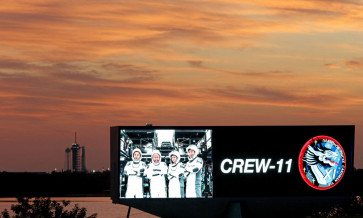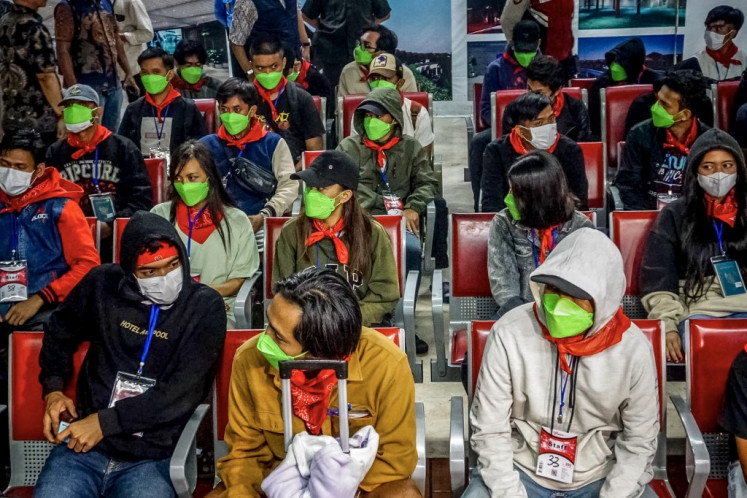Popular Reads
Top Results
Can't find what you're looking for?
View all search resultsPopular Reads
Top Results
Can't find what you're looking for?
View all search resultsDirk Buitelaar: Straightforward and always ready to roll with the punches
Ask airline executive Dirk Buitelaar what his management philosophy is, and he will tell you that he does hold to any one absolute approach
Change text size
Gift Premium Articles
to Anyone
A
sk airline executive Dirk Buitelaar what his management philosophy is, and he will tell you that he does hold to any one absolute approach.
From working in 16 nations on four continents in a span of 23 years, the Dutchman knows that managers have to be ready to think on their feet in rapidly changing situations.
“My management philosophy depends on the type of environment that I am working in and what the organization needs from a manager to achieve the goals that we set out to achieve,” said the country manager of Air France-KLM Indonesia.
Wherever he is in the world, there are two unwavering values underlying his approach.
“For me, being honest and straightforward are key. Sometimes when situations are rife, being politically correct is also important as Dutch are known as straightforward people,” Buitelaar, 53, said.
“I won’t lie to anybody. The worst thing is to destroy trust and a relationship by saying something that is not true.”
The aeronautical engineer started his career in the aviation industry with a small aviation company in St. Maarten, the Caribbean in 1989. When KLM started operation in the area, he joined the airline. Although he later left to open a business with his wife, he returned in 1996.
Before his Jakarta posting, Buitelaar’s assignments included Conakry, Guinea; Abidjan; Lagos; Brussels and Bangkok.
Besides learning from local cultural norms and expectations, Buitelaar also takes cues from people around him, including the strict but fair approach of Frans Gruber, his former boss in the Caribbean.
“I like the fair part but I also like the strict part. If you look at the rules and regulation, each company has its guidelines and we need to work according to the guidelines. At the same time, guidelines are exactly that, not law, only guidelines.”
He also cites Willem Hondius, the general manager of Air France-KLM in Nairobi, who believes nothing is impossible and has an open approach.
“I always think there’s a way around an issue. It takes time and you have to talk to each other because everybody comes from eight directions. We have to listen and try to get a complete picture before taking a decision,” he said.
Buitelaar said the airline industry faced many challenges, both direct and indirect, from economic crises to political instability. And they can arise at any second.
“We are fortunate that we have a senior management team who guides us through the storms of today. Most of us have no clue what the aviation industry will face,” he said.
Group effort
Buitelaar emphasizes the importance of team work. He says he takes time to recognize and build the individuals in his team.
“I like to have a strong team around me. You have to invest time to build the team. Once you have them in place, there is nothing you can’t do,” he said.
He believes his colleagues should be given room to work and be empowered, which means letting them make decisions.
“If you think it is correct, you should continue. If you make mistakes, you can learn from it. If you have freedom in your work, you’ll feel comfortable in your job and more productive than if you’re confined to a specific job and being constantly watched and monitored,” he said.
He likes to ask prospective employee off-the-wall questions during interviews to better understand their personality. He admits he sometimes can be mistaken, and recollects the process of hiring an intern candidate who he thought was unsuitable, but his colleague had a different opinion.
He went along with his colleague’s decision — the person turned out to be the best intern they ever had.
“Sometimes you have to believe in somebody’s gut [instinct]. Give someone an opportunity, follow it through and see what happen, even if you think it’s not the right thing to do. In this case I was proven wrong. Managers can make mistakes,” he said.
For poorly performing employees, Buitelaar holds discussions and performance appraisals setting specific targets and competencies. He said that if employees still failed to live up to the expectations, then perhaps the company was not a fit place for them.
“We have an open discussion and reorganization. The individuals that are not with us are the ones who are not fit to move forward. That’s part of management task: to adapt the organization to what’s coming and have the right people to handle it.”
From his interviews with prospective job candidates, he believes the local education system needs to be improved to better equip people with necessary skills for the workplace.
“What I miss here is the expertise and the quality. Education is a huge part of that process. Not that there are no smart people here, but I think the universities can do better.”
It’s also difficult to keep quality individuals from leaving for jobs with higher remuneration. His firm does its best to keep up with industry salaries.
“Sometimes we are better in some things, sometimes we are lower in others but we believe the company is well-positioned. It does not guarantee the employee will stay because it comes down to the employee’s satisfaction,” he said, adding that quality training also made them prime targets for other firms.
“We’re good in our training path so our colleagues are in high demand because they’re well trained. It doesn’t surprise me that they have opportunities in banking or oil companies. I know that they’re doing better. Also, it’s an opportunity to bring new people in.”
At ease
Work is work, but his family comes first. He turns his BlackBerry off on the weekend, as his wife finds him checking it to be an annoyance, and the sports fan plays soccer (he is a fan of MU, Liverpool and hometown team PSV Eindhoven), a game of tennis or a round of golf.
He takes two to three holidays every year to visit relatives in Belgium and Canada, while also finding time to explore Indonesia with diving holidays.
While Buitelaar describes himself as a strict and fair person, he tries to make a fun work environment and build friendships with colleagues and the people in the country where he works.
He knows first-hand the importance of appreciating life, one day at a time.
“When in Africa, I was involved in managing an aircraft accident, where many people died. It was traumatic, difficult and the one experience that I took with me. I learned that life is short, so have a good time, accept the people around you and absorb the experience,” he said.
“I want my colleagues to come to work the next day because they enjoy it.”
Dirk Buitelaar (JP/Tifa Asrianti)Place and date of birth: Eindhoven, Netherlands, Feb. 11, 1960
Career experience:
Served in several postings with KLM Royal Dutch Airlines over the past 23 years, including in the Netherlands Antilles, Nigeria, Brussels and Bangkok. Assumed position of country manager for Air France-KLM Indonesia in August 2010.
Education background:
Embry-Riddle Aeronautical University in Daytona, the US, majoring in Aeronautical Engineering, 1982-1986










